Psychology Research Methods: Stroop Effect Analysis
VerifiedAdded on 2023/04/23
|14
|2355
|487
Report
AI Summary
This report presents an analysis of the Stroop effect, a cognitive phenomenon, examining the interference in reaction time when naming the color of a word that spells a different color. The study involved 24 participants, equally divided by gender, aged 18-28, who were tested on their response times to congruent and incongruent words. The methodology involved the use of smartphones to record reading times for two lists of words. The results, analyzed using a t-test, indicated a significant difference in the time taken to read congruent versus incongruent words, leading to the rejection of the null hypothesis. The report discusses these findings in the context of cognitive psychology theories such as processing speed, selective attention, and automaticity, and compares them with prior research. It also acknowledges limitations, such as the sample size, and suggests areas for future research, including examining age-related differences in the Stroop effect. The study concludes that the Stroop effect can be used to explain the effect of stimuli in cognition, with incongruence taking longer to process compared to congruence.
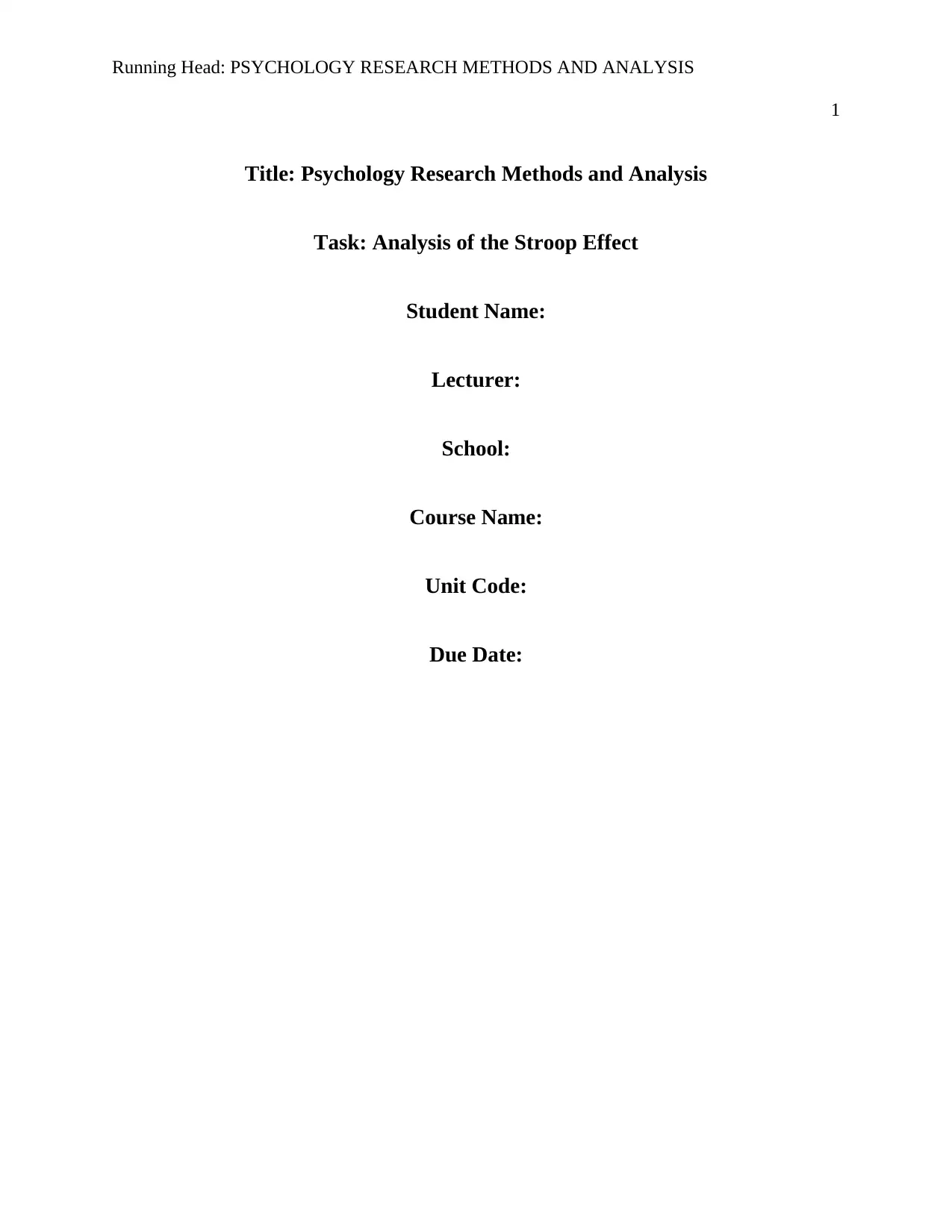
Running Head: PSYCHOLOGY RESEARCH METHODS AND ANALYSIS
1
Title: Psychology Research Methods and Analysis
Task: Analysis of the Stroop Effect
Student Name:
Lecturer:
School:
Course Name:
Unit Code:
Due Date:
1
Title: Psychology Research Methods and Analysis
Task: Analysis of the Stroop Effect
Student Name:
Lecturer:
School:
Course Name:
Unit Code:
Due Date:
Paraphrase This Document
Need a fresh take? Get an instant paraphrase of this document with our AI Paraphraser
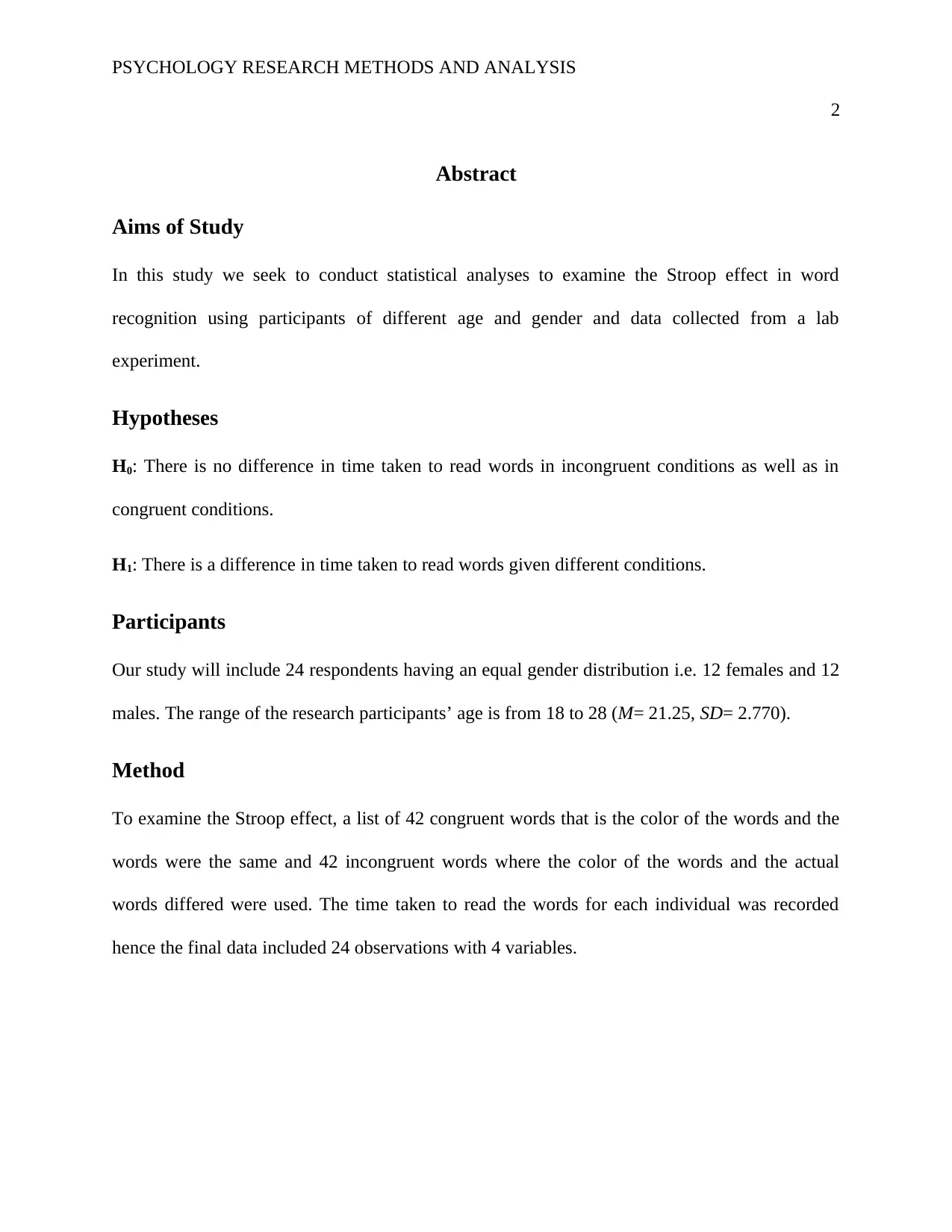
PSYCHOLOGY RESEARCH METHODS AND ANALYSIS
2
Abstract
Aims of Study
In this study we seek to conduct statistical analyses to examine the Stroop effect in word
recognition using participants of different age and gender and data collected from a lab
experiment.
Hypotheses
H0: There is no difference in time taken to read words in incongruent conditions as well as in
congruent conditions.
H1: There is a difference in time taken to read words given different conditions.
Participants
Our study will include 24 respondents having an equal gender distribution i.e. 12 females and 12
males. The range of the research participants’ age is from 18 to 28 (M= 21.25, SD= 2.770).
Method
To examine the Stroop effect, a list of 42 congruent words that is the color of the words and the
words were the same and 42 incongruent words where the color of the words and the actual
words differed were used. The time taken to read the words for each individual was recorded
hence the final data included 24 observations with 4 variables.
2
Abstract
Aims of Study
In this study we seek to conduct statistical analyses to examine the Stroop effect in word
recognition using participants of different age and gender and data collected from a lab
experiment.
Hypotheses
H0: There is no difference in time taken to read words in incongruent conditions as well as in
congruent conditions.
H1: There is a difference in time taken to read words given different conditions.
Participants
Our study will include 24 respondents having an equal gender distribution i.e. 12 females and 12
males. The range of the research participants’ age is from 18 to 28 (M= 21.25, SD= 2.770).
Method
To examine the Stroop effect, a list of 42 congruent words that is the color of the words and the
words were the same and 42 incongruent words where the color of the words and the actual
words differed were used. The time taken to read the words for each individual was recorded
hence the final data included 24 observations with 4 variables.
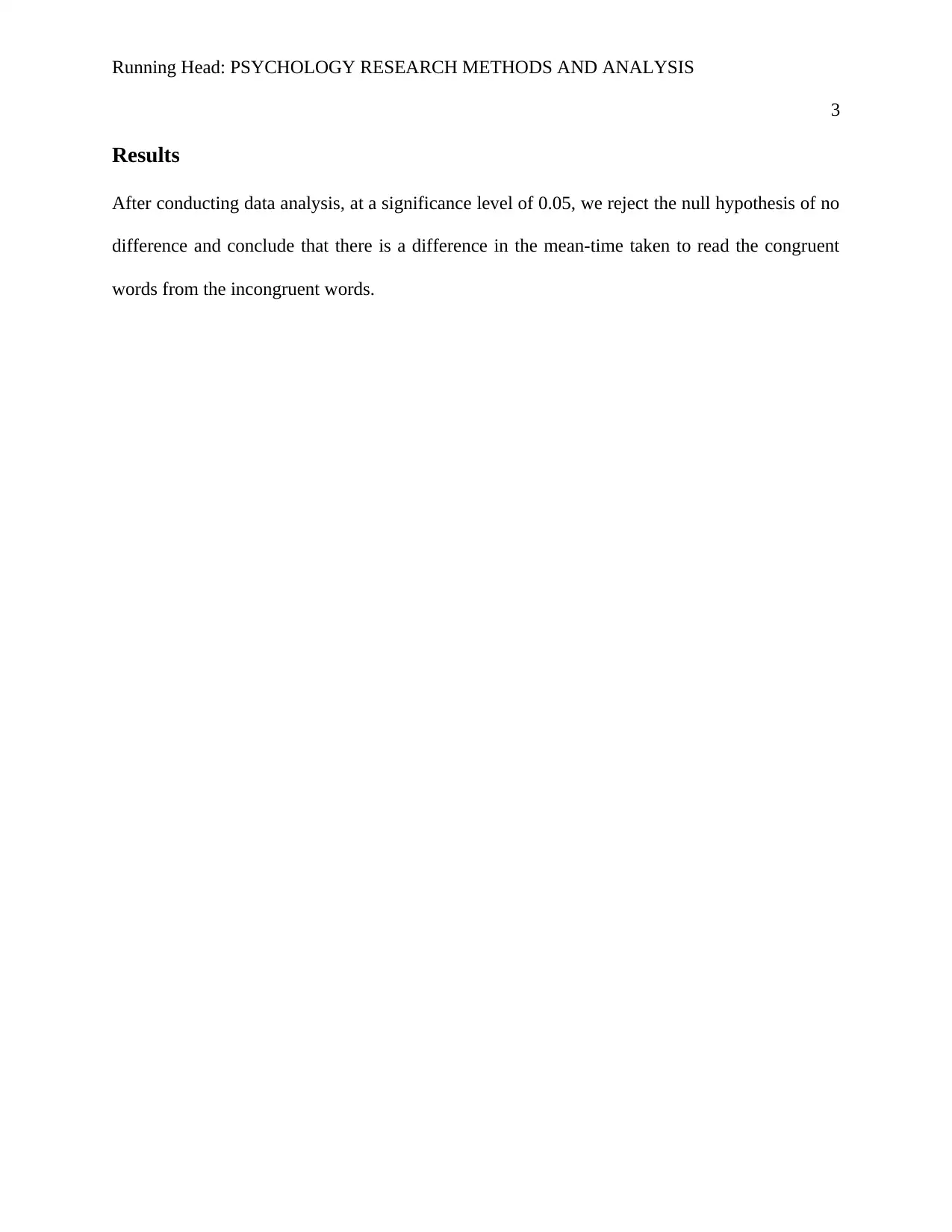
Running Head: PSYCHOLOGY RESEARCH METHODS AND ANALYSIS
3
Results
After conducting data analysis, at a significance level of 0.05, we reject the null hypothesis of no
difference and conclude that there is a difference in the mean-time taken to read the congruent
words from the incongruent words.
3
Results
After conducting data analysis, at a significance level of 0.05, we reject the null hypothesis of no
difference and conclude that there is a difference in the mean-time taken to read the congruent
words from the incongruent words.
⊘ This is a preview!⊘
Do you want full access?
Subscribe today to unlock all pages.

Trusted by 1+ million students worldwide
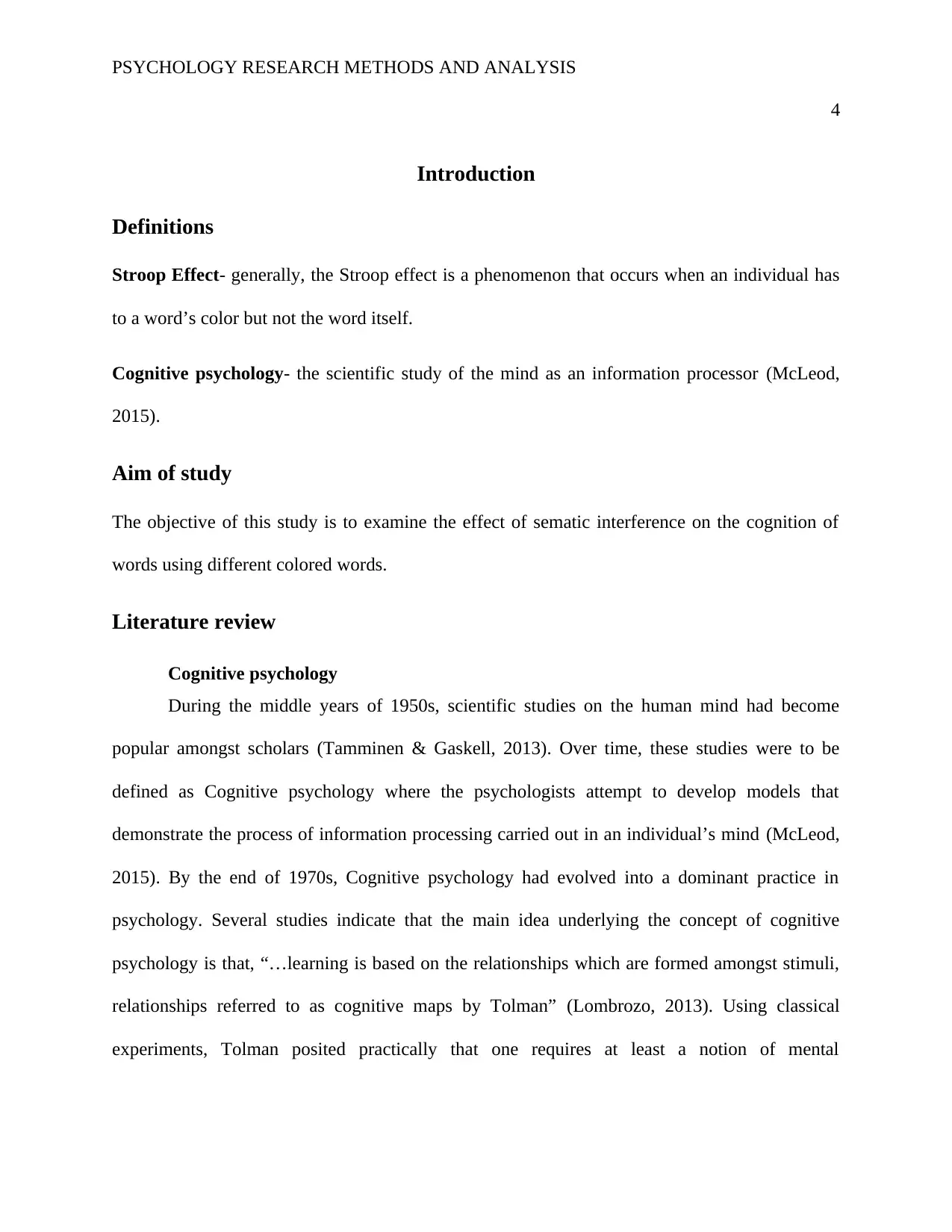
PSYCHOLOGY RESEARCH METHODS AND ANALYSIS
4
Introduction
Definitions
Stroop Effect- generally, the Stroop effect is a phenomenon that occurs when an individual has
to a word’s color but not the word itself.
Cognitive psychology- the scientific study of the mind as an information processor (McLeod,
2015).
Aim of study
The objective of this study is to examine the effect of sematic interference on the cognition of
words using different colored words.
Literature review
Cognitive psychology
During the middle years of 1950s, scientific studies on the human mind had become
popular amongst scholars (Tamminen & Gaskell, 2013). Over time, these studies were to be
defined as Cognitive psychology where the psychologists attempt to develop models that
demonstrate the process of information processing carried out in an individual’s mind (McLeod,
2015). By the end of 1970s, Cognitive psychology had evolved into a dominant practice in
psychology. Several studies indicate that the main idea underlying the concept of cognitive
psychology is that, “…learning is based on the relationships which are formed amongst stimuli,
relationships referred to as cognitive maps by Tolman” (Lombrozo, 2013). Using classical
experiments, Tolman posited practically that one requires at least a notion of mental
4
Introduction
Definitions
Stroop Effect- generally, the Stroop effect is a phenomenon that occurs when an individual has
to a word’s color but not the word itself.
Cognitive psychology- the scientific study of the mind as an information processor (McLeod,
2015).
Aim of study
The objective of this study is to examine the effect of sematic interference on the cognition of
words using different colored words.
Literature review
Cognitive psychology
During the middle years of 1950s, scientific studies on the human mind had become
popular amongst scholars (Tamminen & Gaskell, 2013). Over time, these studies were to be
defined as Cognitive psychology where the psychologists attempt to develop models that
demonstrate the process of information processing carried out in an individual’s mind (McLeod,
2015). By the end of 1970s, Cognitive psychology had evolved into a dominant practice in
psychology. Several studies indicate that the main idea underlying the concept of cognitive
psychology is that, “…learning is based on the relationships which are formed amongst stimuli,
relationships referred to as cognitive maps by Tolman” (Lombrozo, 2013). Using classical
experiments, Tolman posited practically that one requires at least a notion of mental
Paraphrase This Document
Need a fresh take? Get an instant paraphrase of this document with our AI Paraphraser
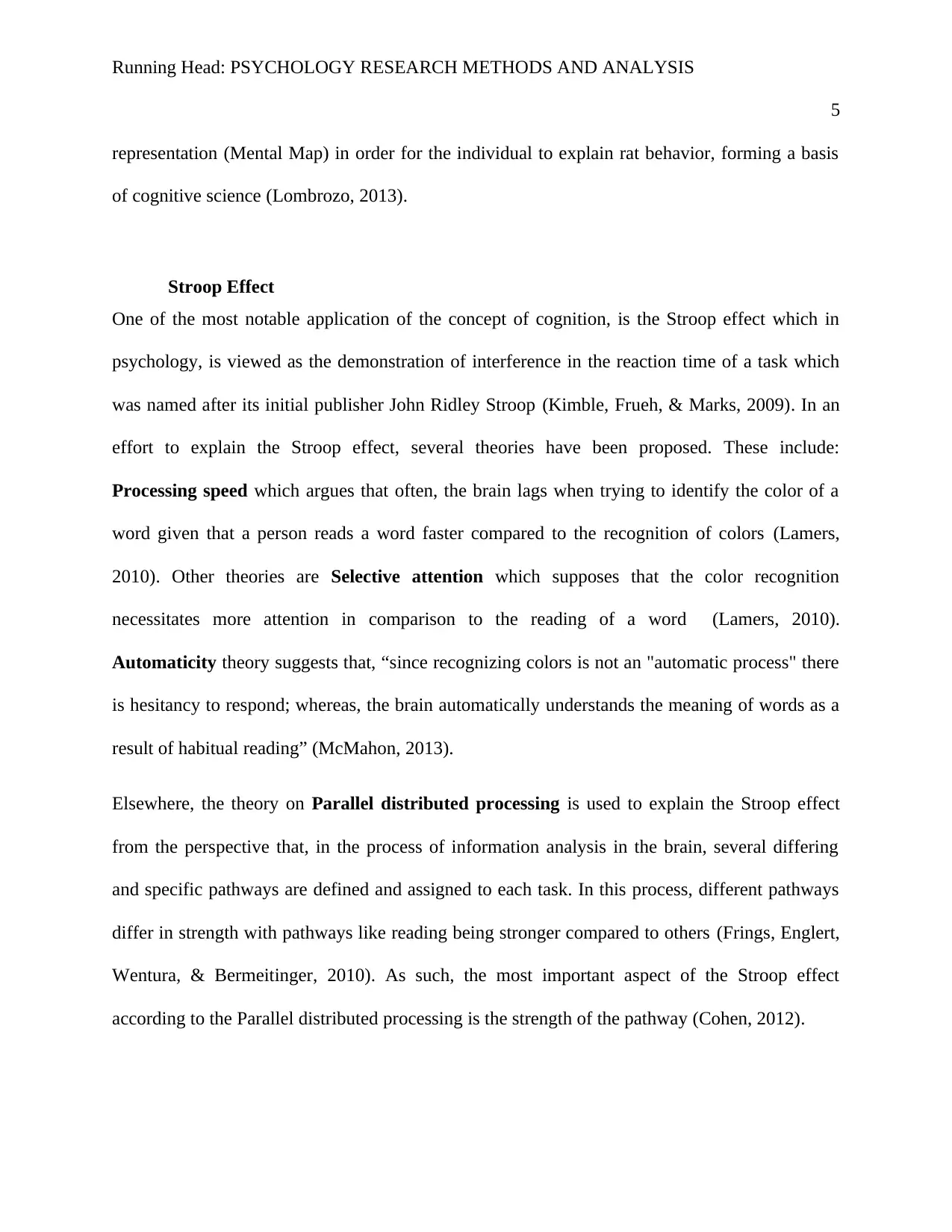
Running Head: PSYCHOLOGY RESEARCH METHODS AND ANALYSIS
5
representation (Mental Map) in order for the individual to explain rat behavior, forming a basis
of cognitive science (Lombrozo, 2013).
Stroop Effect
One of the most notable application of the concept of cognition, is the Stroop effect which in
psychology, is viewed as the demonstration of interference in the reaction time of a task which
was named after its initial publisher John Ridley Stroop (Kimble, Frueh, & Marks, 2009). In an
effort to explain the Stroop effect, several theories have been proposed. These include:
Processing speed which argues that often, the brain lags when trying to identify the color of a
word given that a person reads a word faster compared to the recognition of colors (Lamers,
2010). Other theories are Selective attention which supposes that the color recognition
necessitates more attention in comparison to the reading of a word (Lamers, 2010).
Automaticity theory suggests that, “since recognizing colors is not an "automatic process" there
is hesitancy to respond; whereas, the brain automatically understands the meaning of words as a
result of habitual reading” (McMahon, 2013).
Elsewhere, the theory on Parallel distributed processing is used to explain the Stroop effect
from the perspective that, in the process of information analysis in the brain, several differing
and specific pathways are defined and assigned to each task. In this process, different pathways
differ in strength with pathways like reading being stronger compared to others (Frings, Englert,
Wentura, & Bermeitinger, 2010). As such, the most important aspect of the Stroop effect
according to the Parallel distributed processing is the strength of the pathway (Cohen, 2012).
5
representation (Mental Map) in order for the individual to explain rat behavior, forming a basis
of cognitive science (Lombrozo, 2013).
Stroop Effect
One of the most notable application of the concept of cognition, is the Stroop effect which in
psychology, is viewed as the demonstration of interference in the reaction time of a task which
was named after its initial publisher John Ridley Stroop (Kimble, Frueh, & Marks, 2009). In an
effort to explain the Stroop effect, several theories have been proposed. These include:
Processing speed which argues that often, the brain lags when trying to identify the color of a
word given that a person reads a word faster compared to the recognition of colors (Lamers,
2010). Other theories are Selective attention which supposes that the color recognition
necessitates more attention in comparison to the reading of a word (Lamers, 2010).
Automaticity theory suggests that, “since recognizing colors is not an "automatic process" there
is hesitancy to respond; whereas, the brain automatically understands the meaning of words as a
result of habitual reading” (McMahon, 2013).
Elsewhere, the theory on Parallel distributed processing is used to explain the Stroop effect
from the perspective that, in the process of information analysis in the brain, several differing
and specific pathways are defined and assigned to each task. In this process, different pathways
differ in strength with pathways like reading being stronger compared to others (Frings, Englert,
Wentura, & Bermeitinger, 2010). As such, the most important aspect of the Stroop effect
according to the Parallel distributed processing is the strength of the pathway (Cohen, 2012).
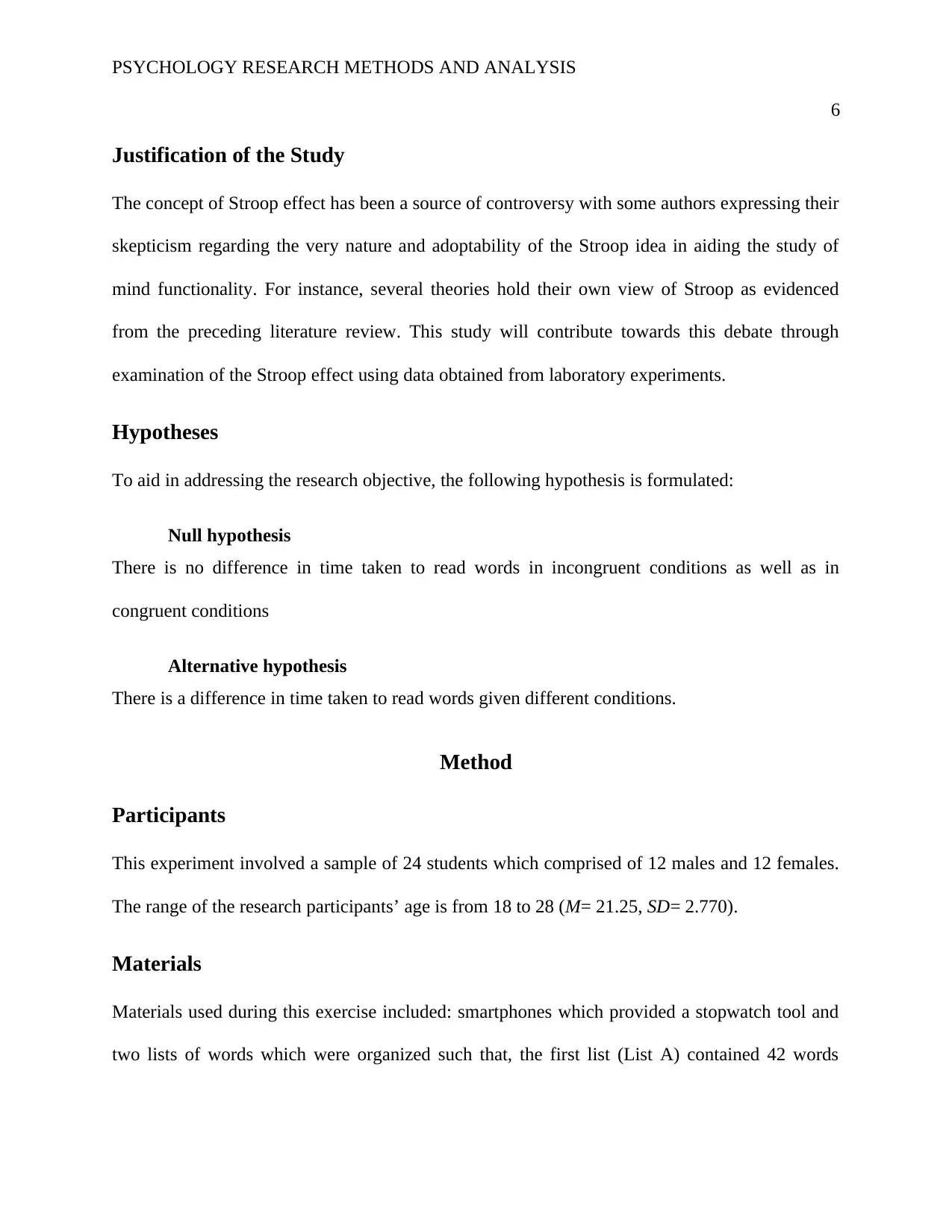
PSYCHOLOGY RESEARCH METHODS AND ANALYSIS
6
Justification of the Study
The concept of Stroop effect has been a source of controversy with some authors expressing their
skepticism regarding the very nature and adoptability of the Stroop idea in aiding the study of
mind functionality. For instance, several theories hold their own view of Stroop as evidenced
from the preceding literature review. This study will contribute towards this debate through
examination of the Stroop effect using data obtained from laboratory experiments.
Hypotheses
To aid in addressing the research objective, the following hypothesis is formulated:
Null hypothesis
There is no difference in time taken to read words in incongruent conditions as well as in
congruent conditions
Alternative hypothesis
There is a difference in time taken to read words given different conditions.
Method
Participants
This experiment involved a sample of 24 students which comprised of 12 males and 12 females.
The range of the research participants’ age is from 18 to 28 (M= 21.25, SD= 2.770).
Materials
Materials used during this exercise included: smartphones which provided a stopwatch tool and
two lists of words which were organized such that, the first list (List A) contained 42 words
6
Justification of the Study
The concept of Stroop effect has been a source of controversy with some authors expressing their
skepticism regarding the very nature and adoptability of the Stroop idea in aiding the study of
mind functionality. For instance, several theories hold their own view of Stroop as evidenced
from the preceding literature review. This study will contribute towards this debate through
examination of the Stroop effect using data obtained from laboratory experiments.
Hypotheses
To aid in addressing the research objective, the following hypothesis is formulated:
Null hypothesis
There is no difference in time taken to read words in incongruent conditions as well as in
congruent conditions
Alternative hypothesis
There is a difference in time taken to read words given different conditions.
Method
Participants
This experiment involved a sample of 24 students which comprised of 12 males and 12 females.
The range of the research participants’ age is from 18 to 28 (M= 21.25, SD= 2.770).
Materials
Materials used during this exercise included: smartphones which provided a stopwatch tool and
two lists of words which were organized such that, the first list (List A) contained 42 words
⊘ This is a preview!⊘
Do you want full access?
Subscribe today to unlock all pages.

Trusted by 1+ million students worldwide
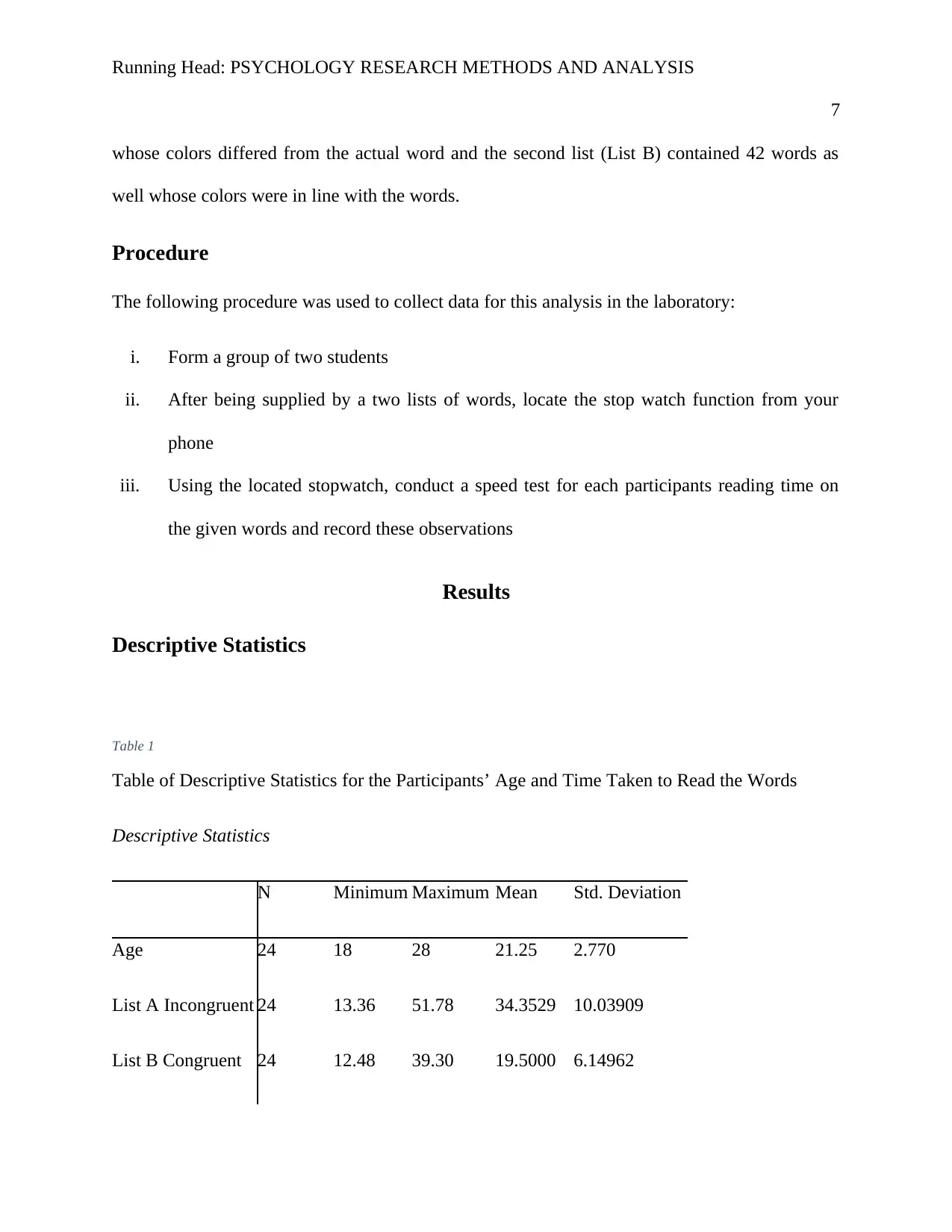
Running Head: PSYCHOLOGY RESEARCH METHODS AND ANALYSIS
7
whose colors differed from the actual word and the second list (List B) contained 42 words as
well whose colors were in line with the words.
Procedure
The following procedure was used to collect data for this analysis in the laboratory:
i. Form a group of two students
ii. After being supplied by a two lists of words, locate the stop watch function from your
phone
iii. Using the located stopwatch, conduct a speed test for each participants reading time on
the given words and record these observations
Results
Descriptive Statistics
Table 1
Table of Descriptive Statistics for the Participants’ Age and Time Taken to Read the Words
Descriptive Statistics
N Minimum Maximum Mean Std. Deviation
Age 24 18 28 21.25 2.770
List A Incongruent 24 13.36 51.78 34.3529 10.03909
List B Congruent 24 12.48 39.30 19.5000 6.14962
7
whose colors differed from the actual word and the second list (List B) contained 42 words as
well whose colors were in line with the words.
Procedure
The following procedure was used to collect data for this analysis in the laboratory:
i. Form a group of two students
ii. After being supplied by a two lists of words, locate the stop watch function from your
phone
iii. Using the located stopwatch, conduct a speed test for each participants reading time on
the given words and record these observations
Results
Descriptive Statistics
Table 1
Table of Descriptive Statistics for the Participants’ Age and Time Taken to Read the Words
Descriptive Statistics
N Minimum Maximum Mean Std. Deviation
Age 24 18 28 21.25 2.770
List A Incongruent 24 13.36 51.78 34.3529 10.03909
List B Congruent 24 12.48 39.30 19.5000 6.14962
Paraphrase This Document
Need a fresh take? Get an instant paraphrase of this document with our AI Paraphraser
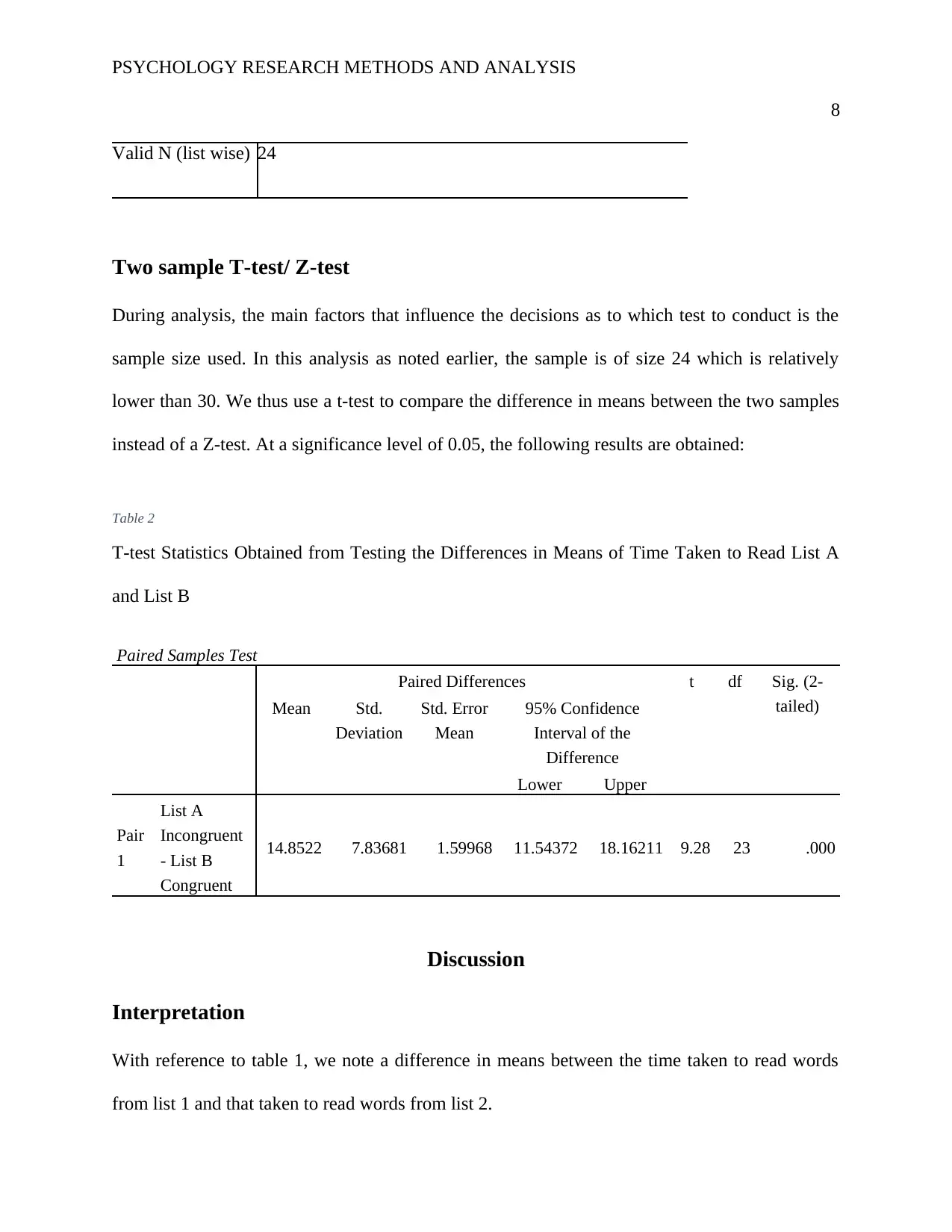
PSYCHOLOGY RESEARCH METHODS AND ANALYSIS
8
Valid N (list wise) 24
Two sample T-test/ Z-test
During analysis, the main factors that influence the decisions as to which test to conduct is the
sample size used. In this analysis as noted earlier, the sample is of size 24 which is relatively
lower than 30. We thus use a t-test to compare the difference in means between the two samples
instead of a Z-test. At a significance level of 0.05, the following results are obtained:
Table 2
T-test Statistics Obtained from Testing the Differences in Means of Time Taken to Read List A
and List B
Paired Samples Test
Paired Differences t df Sig. (2-
tailed)Mean Std.
Deviation
Std. Error
Mean
95% Confidence
Interval of the
Difference
Lower Upper
Pair
1
List A
Incongruent
- List B
Congruent
14.8522 7.83681 1.59968 11.54372 18.16211 9.28 23 .000
Discussion
Interpretation
With reference to table 1, we note a difference in means between the time taken to read words
from list 1 and that taken to read words from list 2.
8
Valid N (list wise) 24
Two sample T-test/ Z-test
During analysis, the main factors that influence the decisions as to which test to conduct is the
sample size used. In this analysis as noted earlier, the sample is of size 24 which is relatively
lower than 30. We thus use a t-test to compare the difference in means between the two samples
instead of a Z-test. At a significance level of 0.05, the following results are obtained:
Table 2
T-test Statistics Obtained from Testing the Differences in Means of Time Taken to Read List A
and List B
Paired Samples Test
Paired Differences t df Sig. (2-
tailed)Mean Std.
Deviation
Std. Error
Mean
95% Confidence
Interval of the
Difference
Lower Upper
Pair
1
List A
Incongruent
- List B
Congruent
14.8522 7.83681 1.59968 11.54372 18.16211 9.28 23 .000
Discussion
Interpretation
With reference to table 1, we note a difference in means between the time taken to read words
from list 1 and that taken to read words from list 2.
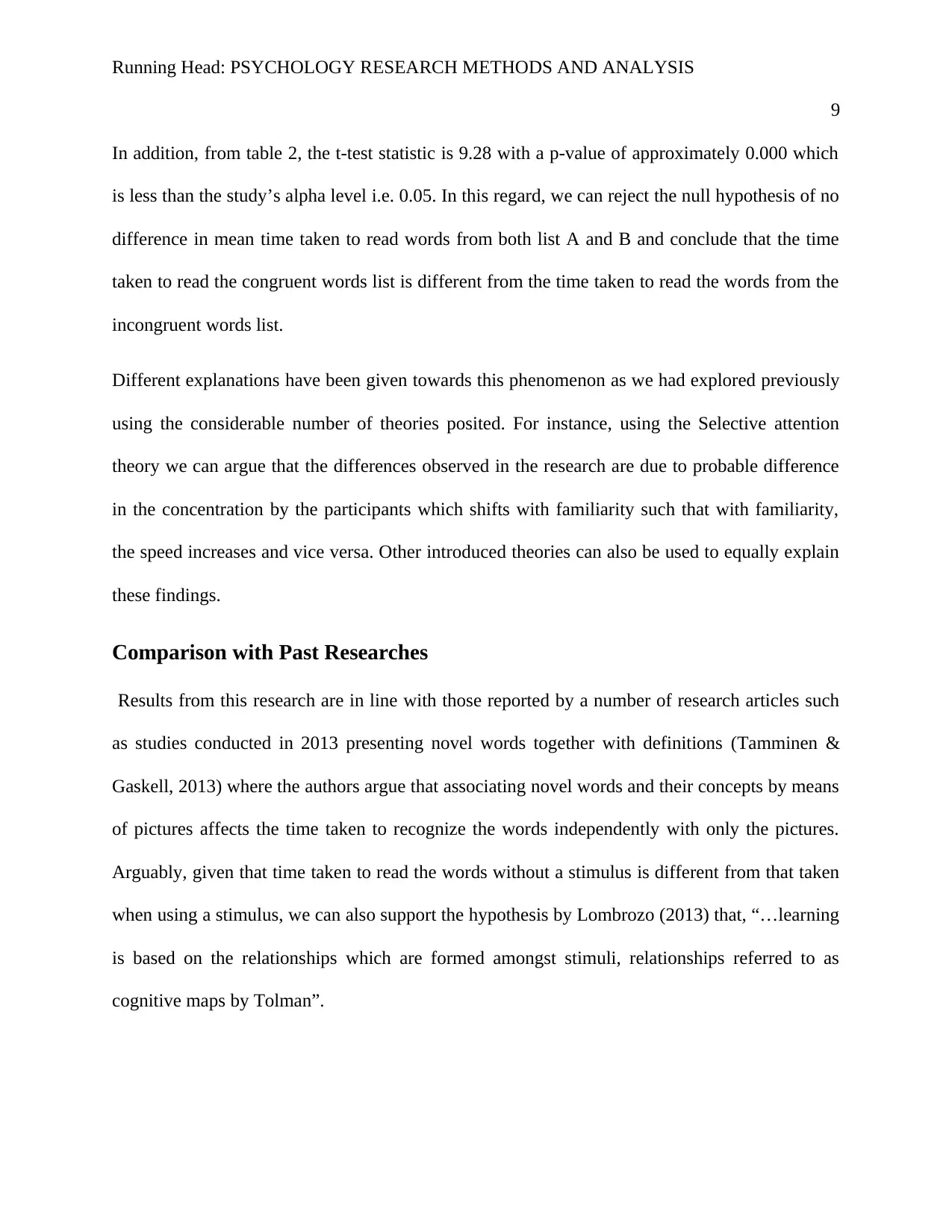
Running Head: PSYCHOLOGY RESEARCH METHODS AND ANALYSIS
9
In addition, from table 2, the t-test statistic is 9.28 with a p-value of approximately 0.000 which
is less than the study’s alpha level i.e. 0.05. In this regard, we can reject the null hypothesis of no
difference in mean time taken to read words from both list A and B and conclude that the time
taken to read the congruent words list is different from the time taken to read the words from the
incongruent words list.
Different explanations have been given towards this phenomenon as we had explored previously
using the considerable number of theories posited. For instance, using the Selective attention
theory we can argue that the differences observed in the research are due to probable difference
in the concentration by the participants which shifts with familiarity such that with familiarity,
the speed increases and vice versa. Other introduced theories can also be used to equally explain
these findings.
Comparison with Past Researches
Results from this research are in line with those reported by a number of research articles such
as studies conducted in 2013 presenting novel words together with definitions (Tamminen &
Gaskell, 2013) where the authors argue that associating novel words and their concepts by means
of pictures affects the time taken to recognize the words independently with only the pictures.
Arguably, given that time taken to read the words without a stimulus is different from that taken
when using a stimulus, we can also support the hypothesis by Lombrozo (2013) that, “…learning
is based on the relationships which are formed amongst stimuli, relationships referred to as
cognitive maps by Tolman”.
9
In addition, from table 2, the t-test statistic is 9.28 with a p-value of approximately 0.000 which
is less than the study’s alpha level i.e. 0.05. In this regard, we can reject the null hypothesis of no
difference in mean time taken to read words from both list A and B and conclude that the time
taken to read the congruent words list is different from the time taken to read the words from the
incongruent words list.
Different explanations have been given towards this phenomenon as we had explored previously
using the considerable number of theories posited. For instance, using the Selective attention
theory we can argue that the differences observed in the research are due to probable difference
in the concentration by the participants which shifts with familiarity such that with familiarity,
the speed increases and vice versa. Other introduced theories can also be used to equally explain
these findings.
Comparison with Past Researches
Results from this research are in line with those reported by a number of research articles such
as studies conducted in 2013 presenting novel words together with definitions (Tamminen &
Gaskell, 2013) where the authors argue that associating novel words and their concepts by means
of pictures affects the time taken to recognize the words independently with only the pictures.
Arguably, given that time taken to read the words without a stimulus is different from that taken
when using a stimulus, we can also support the hypothesis by Lombrozo (2013) that, “…learning
is based on the relationships which are formed amongst stimuli, relationships referred to as
cognitive maps by Tolman”.
⊘ This is a preview!⊘
Do you want full access?
Subscribe today to unlock all pages.

Trusted by 1+ million students worldwide
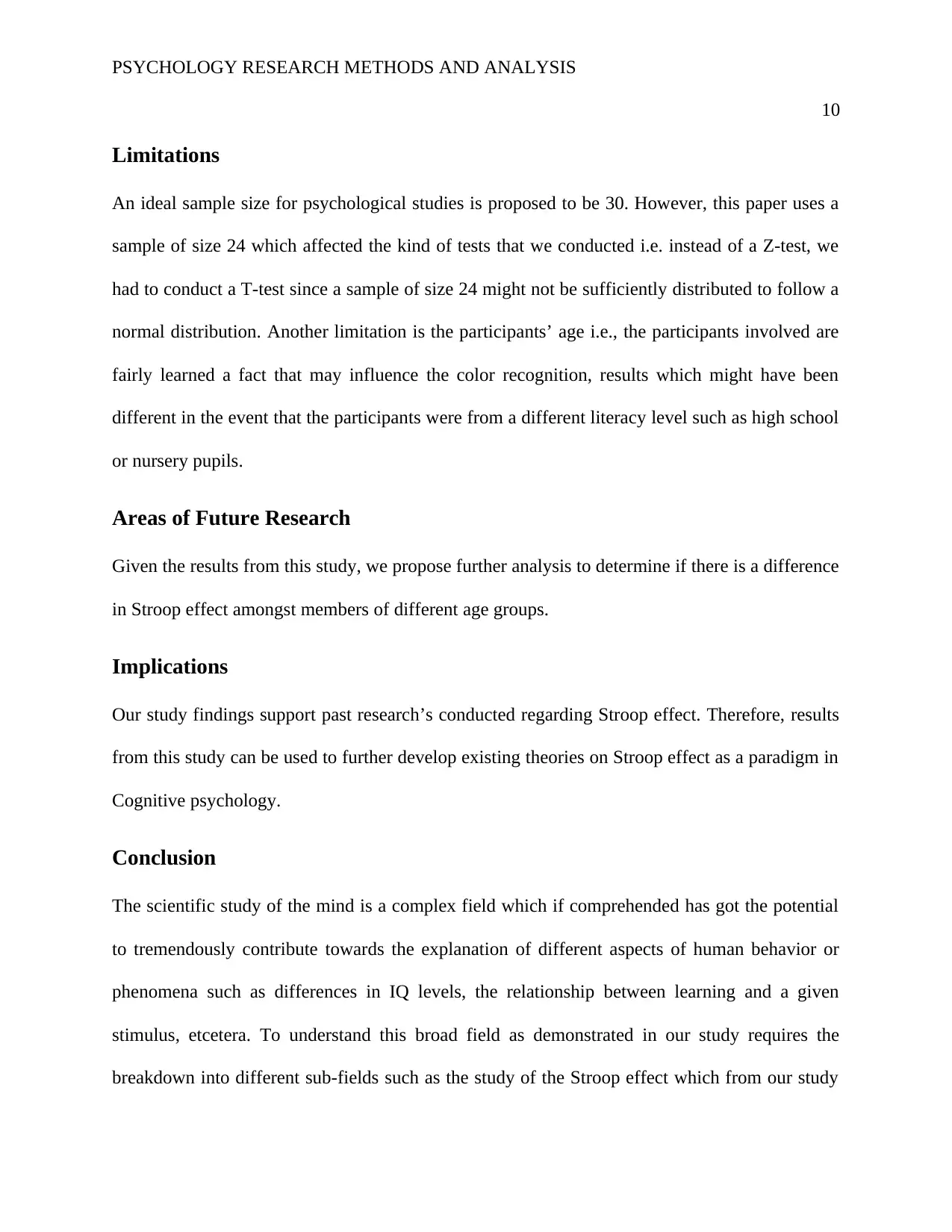
PSYCHOLOGY RESEARCH METHODS AND ANALYSIS
10
Limitations
An ideal sample size for psychological studies is proposed to be 30. However, this paper uses a
sample of size 24 which affected the kind of tests that we conducted i.e. instead of a Z-test, we
had to conduct a T-test since a sample of size 24 might not be sufficiently distributed to follow a
normal distribution. Another limitation is the participants’ age i.e., the participants involved are
fairly learned a fact that may influence the color recognition, results which might have been
different in the event that the participants were from a different literacy level such as high school
or nursery pupils.
Areas of Future Research
Given the results from this study, we propose further analysis to determine if there is a difference
in Stroop effect amongst members of different age groups.
Implications
Our study findings support past research’s conducted regarding Stroop effect. Therefore, results
from this study can be used to further develop existing theories on Stroop effect as a paradigm in
Cognitive psychology.
Conclusion
The scientific study of the mind is a complex field which if comprehended has got the potential
to tremendously contribute towards the explanation of different aspects of human behavior or
phenomena such as differences in IQ levels, the relationship between learning and a given
stimulus, etcetera. To understand this broad field as demonstrated in our study requires the
breakdown into different sub-fields such as the study of the Stroop effect which from our study
10
Limitations
An ideal sample size for psychological studies is proposed to be 30. However, this paper uses a
sample of size 24 which affected the kind of tests that we conducted i.e. instead of a Z-test, we
had to conduct a T-test since a sample of size 24 might not be sufficiently distributed to follow a
normal distribution. Another limitation is the participants’ age i.e., the participants involved are
fairly learned a fact that may influence the color recognition, results which might have been
different in the event that the participants were from a different literacy level such as high school
or nursery pupils.
Areas of Future Research
Given the results from this study, we propose further analysis to determine if there is a difference
in Stroop effect amongst members of different age groups.
Implications
Our study findings support past research’s conducted regarding Stroop effect. Therefore, results
from this study can be used to further develop existing theories on Stroop effect as a paradigm in
Cognitive psychology.
Conclusion
The scientific study of the mind is a complex field which if comprehended has got the potential
to tremendously contribute towards the explanation of different aspects of human behavior or
phenomena such as differences in IQ levels, the relationship between learning and a given
stimulus, etcetera. To understand this broad field as demonstrated in our study requires the
breakdown into different sub-fields such as the study of the Stroop effect which from our study
Paraphrase This Document
Need a fresh take? Get an instant paraphrase of this document with our AI Paraphraser
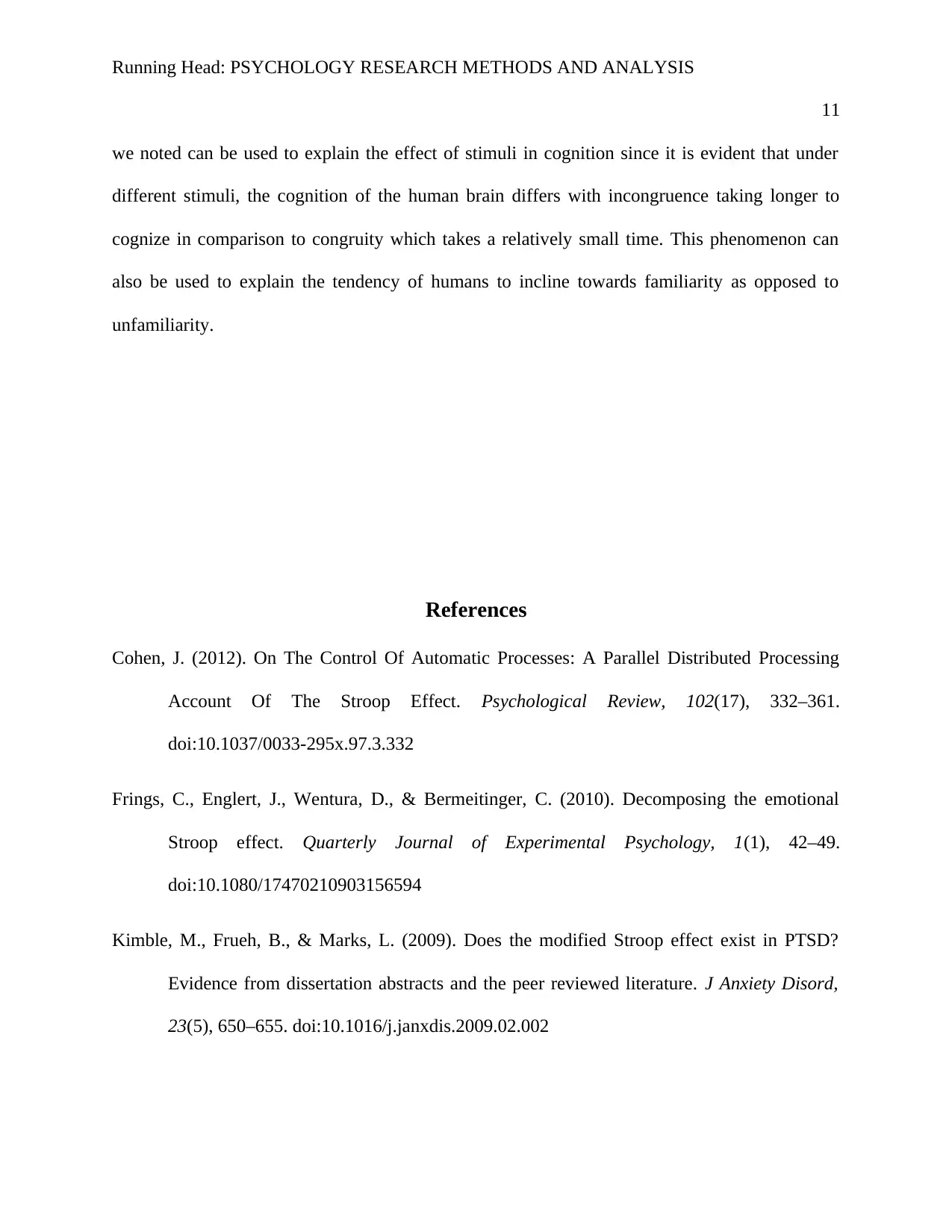
Running Head: PSYCHOLOGY RESEARCH METHODS AND ANALYSIS
11
we noted can be used to explain the effect of stimuli in cognition since it is evident that under
different stimuli, the cognition of the human brain differs with incongruence taking longer to
cognize in comparison to congruity which takes a relatively small time. This phenomenon can
also be used to explain the tendency of humans to incline towards familiarity as opposed to
unfamiliarity.
References
Cohen, J. (2012). On The Control Of Automatic Processes: A Parallel Distributed Processing
Account Of The Stroop Effect. Psychological Review, 102(17), 332–361.
doi:10.1037/0033-295x.97.3.332
Frings, C., Englert, J., Wentura, D., & Bermeitinger, C. (2010). Decomposing the emotional
Stroop effect. Quarterly Journal of Experimental Psychology, 1(1), 42–49.
doi:10.1080/17470210903156594
Kimble, M., Frueh, B., & Marks, L. (2009). Does the modified Stroop effect exist in PTSD?
Evidence from dissertation abstracts and the peer reviewed literature. J Anxiety Disord,
23(5), 650–655. doi:10.1016/j.janxdis.2009.02.002
11
we noted can be used to explain the effect of stimuli in cognition since it is evident that under
different stimuli, the cognition of the human brain differs with incongruence taking longer to
cognize in comparison to congruity which takes a relatively small time. This phenomenon can
also be used to explain the tendency of humans to incline towards familiarity as opposed to
unfamiliarity.
References
Cohen, J. (2012). On The Control Of Automatic Processes: A Parallel Distributed Processing
Account Of The Stroop Effect. Psychological Review, 102(17), 332–361.
doi:10.1037/0033-295x.97.3.332
Frings, C., Englert, J., Wentura, D., & Bermeitinger, C. (2010). Decomposing the emotional
Stroop effect. Quarterly Journal of Experimental Psychology, 1(1), 42–49.
doi:10.1080/17470210903156594
Kimble, M., Frueh, B., & Marks, L. (2009). Does the modified Stroop effect exist in PTSD?
Evidence from dissertation abstracts and the peer reviewed literature. J Anxiety Disord,
23(5), 650–655. doi:10.1016/j.janxdis.2009.02.002
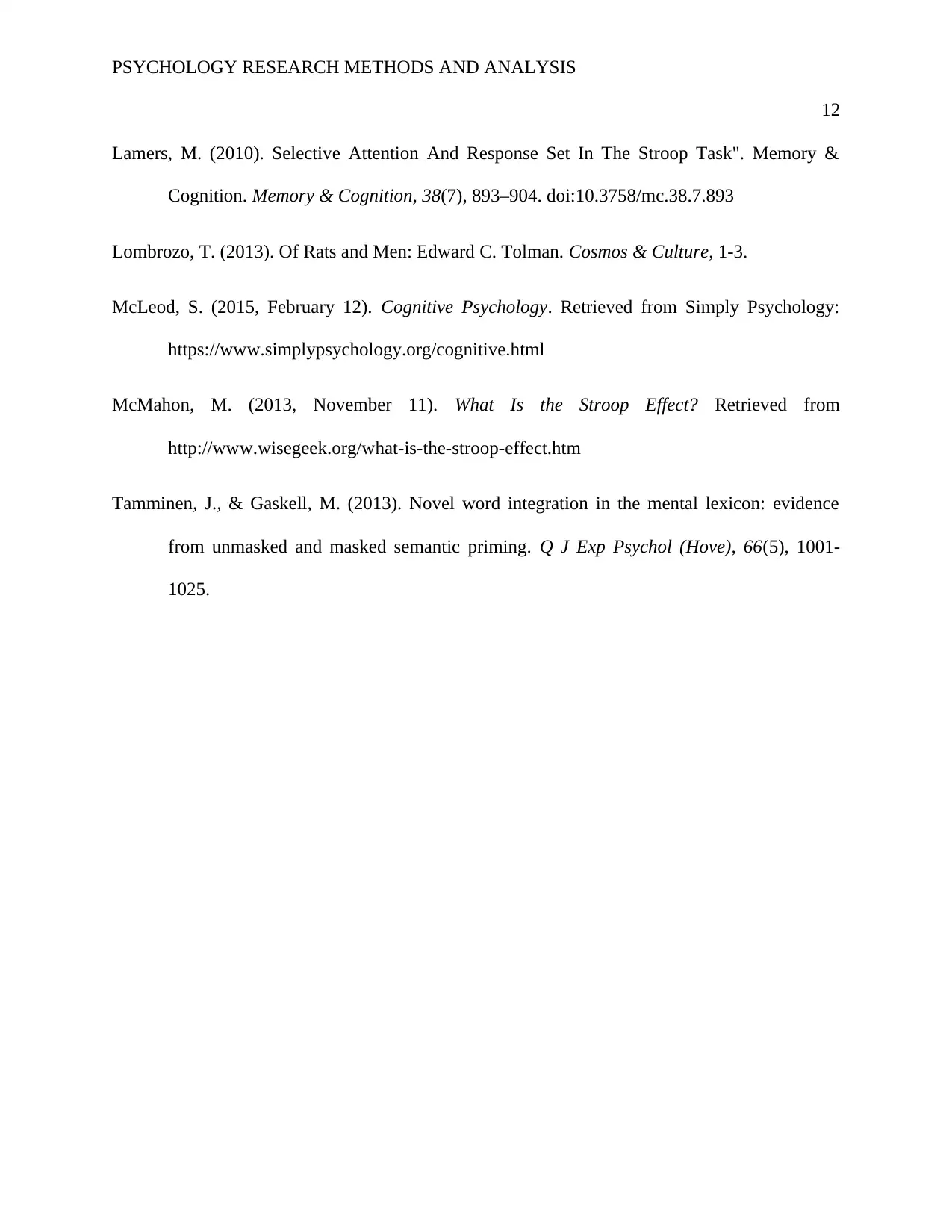
PSYCHOLOGY RESEARCH METHODS AND ANALYSIS
12
Lamers, M. (2010). Selective Attention And Response Set In The Stroop Task". Memory &
Cognition. Memory & Cognition, 38(7), 893–904. doi:10.3758/mc.38.7.893
Lombrozo, T. (2013). Of Rats and Men: Edward C. Tolman. Cosmos & Culture, 1-3.
McLeod, S. (2015, February 12). Cognitive Psychology. Retrieved from Simply Psychology:
https://www.simplypsychology.org/cognitive.html
McMahon, M. (2013, November 11). What Is the Stroop Effect? Retrieved from
http://www.wisegeek.org/what-is-the-stroop-effect.htm
Tamminen, J., & Gaskell, M. (2013). Novel word integration in the mental lexicon: evidence
from unmasked and masked semantic priming. Q J Exp Psychol (Hove), 66(5), 1001-
1025.
12
Lamers, M. (2010). Selective Attention And Response Set In The Stroop Task". Memory &
Cognition. Memory & Cognition, 38(7), 893–904. doi:10.3758/mc.38.7.893
Lombrozo, T. (2013). Of Rats and Men: Edward C. Tolman. Cosmos & Culture, 1-3.
McLeod, S. (2015, February 12). Cognitive Psychology. Retrieved from Simply Psychology:
https://www.simplypsychology.org/cognitive.html
McMahon, M. (2013, November 11). What Is the Stroop Effect? Retrieved from
http://www.wisegeek.org/what-is-the-stroop-effect.htm
Tamminen, J., & Gaskell, M. (2013). Novel word integration in the mental lexicon: evidence
from unmasked and masked semantic priming. Q J Exp Psychol (Hove), 66(5), 1001-
1025.
⊘ This is a preview!⊘
Do you want full access?
Subscribe today to unlock all pages.

Trusted by 1+ million students worldwide
1 out of 14
Related Documents
Your All-in-One AI-Powered Toolkit for Academic Success.
+13062052269
info@desklib.com
Available 24*7 on WhatsApp / Email
![[object Object]](/_next/static/media/star-bottom.7253800d.svg)
Unlock your academic potential
Copyright © 2020–2026 A2Z Services. All Rights Reserved. Developed and managed by ZUCOL.





